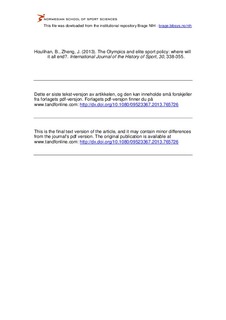| dc.contributor.author | Houlihan, Barrie | |
| dc.contributor.author | Zheng, Jinming | |
| dc.date.accessioned | 2014-09-03T13:03:04Z | |
| dc.date.available | 2014-09-03T13:03:04Z | |
| dc.date.issued | 2013-03-01 | |
| dc.identifier.citation | International Journal of the History of Sport. 2013, 30, 338-355 | nb_NO |
| dc.identifier.uri | http://hdl.handle.net/11250/218697 | |
| dc.description | Brage finner du siste tekst-versjon av artikkelen, og den kan inneholde ubetydelige forskjeller fra forlagets pdf-versjon. Forlagets pdf-versjon finner du på www.tandfonline.com: http://dx.doi.org/10.1080/09523367.2013.765726 / In Brage you'll find the final text version of the article, and it may contain insignificant differences from the journal's pdf version. The definitive version is available at www.tandfonline.com: http://dx.doi.org/10.1080/09523367.2013.765726 | nb_NO |
| dc.description.abstract | The aim of the paper is to explore the consequences of the intensification of competition among the most successful countries at the Olympic Games – the sports powers – for participating countries, potential host countries and the International Olympic Committee. The paper begins by tracing briefly the emergence of increasingly sophisticated and expensive elite sports systems and then examines some of the characteristics of these systems paying particular attention to the extent to which selected major sports powers and medium powers have developed a competitive advantage in a relatively narrow range of sports. Data for the paper were collected through the analysis of a range of financial and sport performance data and the analysis of political indices of democracy. The main findings of the paper are as follows: (1) identifying sports in which a country has a relative competitive advantage remains crucial for the continuing success of major sports powers and is becoming increasingly important for medium sports powers; (2) the cost of maintaining a country's relative position in the medals table is considerable and arguably locks countries on to a path from which it is difficult for them to deviate; (3) the increasing concern with providing security for the Games may have a deterrent effect on the willingness of more open democratic countries to bid to host the Games; (4) the International Olympic Committee faces a potential challenge in providing the majority of countries that attend the Games, but which do not win a medal, with a return on their investment in the Olympics. | nb_NO |
| dc.language.iso | eng | nb_NO |
| dc.publisher | Taylor & Francis | nb_NO |
| dc.subject | olympic games | nb_NO |
| dc.subject | security | nb_NO |
| dc.subject | competitive advantage | nb_NO |
| dc.subject | democracy | nb_NO |
| dc.subject | hosting | nb_NO |
| dc.title | The Olympics and elite sport policy: where will it all end? | nb_NO |
| dc.type | Journal article | nb_NO |
| dc.type | Peer reviewed | nb_NO |
| dc.subject.nsi | VDP::Humanities: 000::History: 070 | nb_NO |
| dc.subject.nsi | VDP::Social science: 200::Social science in sports: 330 | nb_NO |
| dc.source.journal | International Journal of the History of Sport | nb_NO |
| dc.description.localcode | Seksjon for kultur og samfunn / Department of Cultural and Social Studies | nb_NO |
